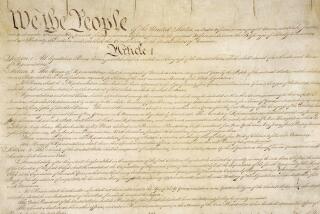Founders’ Imperfections Don’t Warrant Contempt
- Share via
Americans are divided today over questions of immigration, welfare, race and sexual morality. These disputes are not new. They involve the principles and ideas on which our country was built.
Unfortunately, too many Americans today are unfamiliar with the principles that shape American politics or the institutions of our government. A survey recently conducted by the National Constitution Center shows that 40% of Americans do not know that there are three branches of the federal government. Half do not know the number of U.S. senators. One-quarter cannot name a single right protected by the 1st Amendment. This ignorance is dangerous. Self-government requires that we understand the foundation of our government.
But unfamiliarity with facts can be corrected. More worrisome is that in many college and high school classrooms, students are being taught (perhaps the better word is indoctrinated) that the founding fathers were simply contemptible--racist, sexist and indifferent to the poor.
A new book, “Vindicating the Founders: Race, Sex , Class and Justice in the Origins of America,” shows that this contempt is the standard interpretation given in many textbooks. But most ordinary Americans still respect the founders as great and noble, says the author, Thomas G. West. This does not mean that the founding of this country had no defects. But the defects need to put in perspective.
One common charge today is that the founders were sexists and ignored the rights of women. Just because the founders did not share the view of modern feminism does not mean they degraded or disregarded women. The founders thought that men and women had equally important but different roles in society. They believed that both men and women would find their interests and happiness in that core institution of a free and civilized society: the family.
West makes a convincing case that the founders’ pro-family philosophies secured the life, liberty and pursuit of happiness of women better than today’s practices of sexual promiscuity, shallow commitments and objectifying women and men.
Another criticism of the founders is that they allowed the continuation of slavery. In fact, every leading founder acknowledged slavery to be a great moral evil. It was legal and practiced in every state in 1776; but by the end of the founding era, more than a 100,000 slaves had been freed and slavery was outlawed in seven of the 13 states.
The founders could not completely eliminate slavery in their time. As West shows, if they had tried to abolish slavery immediately they would have destroyed the Union before it was even born.
Understanding the difficulties and obstacles confronting the men who led the American Revolution and wrote the Constitution helps us appreciate the greatness of their accomplishments. They established a constitutional government that enabled a larger number of men and women to live in prosperity and liberty than any other nation has ever done.
Our current problems are serious and not easily solved. They will not be solved at all if we do not get clear on the ideas of liberty, equality and the public and private roles of family, morality, religion and private property. In thinking through the founding principles, we solve nothing by mindlessly condemning the founders. They established a new country based on noble ideas and they adapted those ideas as wisely and honestly as they could to the difficult circumstances they faced. That is a lesson we would do well to study.
More to Read
Sign up for our Book Club newsletter
Get the latest news, events and more from the Los Angeles Times Book Club, and help us get L.A. reading and talking.
You may occasionally receive promotional content from the Los Angeles Times.










